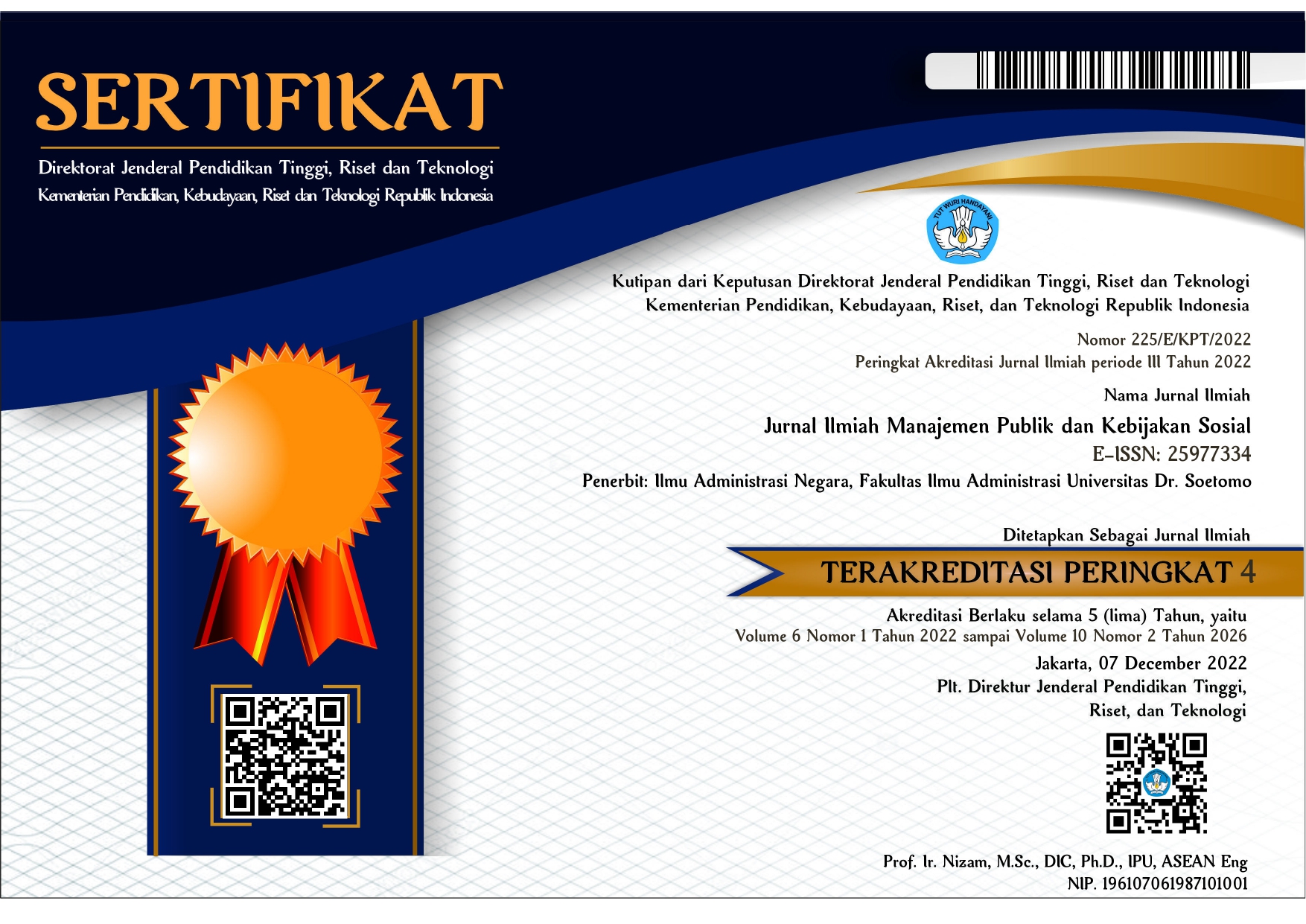Analisis Pemberdayaan Perempuan Berbasis Umkm Dalam Meningkatkan Kewirausahaan Keluarga Di Kecamatan Benowo, Surabaya
 Abstract views: 378
,
Abstract views: 378
,
 PDF (Bahasa Indonesia) downloads: 352
PDF (Bahasa Indonesia) downloads: 352
Abstract
Entrepreneurial skills need to be applied to every individual because it requires everyone to have non-academic abilities and skills that are useful for creating quality human resources. This research aims to provide a concrete study regarding the empowerment of UMKM women in improving their entrepreneurial abilities, based on the results of field interviews. Women's empowerment carried out in Benowo district aims to create opportunities for the establishment of effective UMKM-based businesses. This research methodology uses explanatory qualitative research based on UMKMs to strengthen family entrepreneurship with the aim of empowering the community, especially women. The respondents were the Benowo District government, PKK cadres and UMK actors, especially women. And the focus of this research is UMKM-based women's empowerment in increasing family entrepreneurship in Benowo District and the results obtained in this research are that women's empowerment in Benowo District has been implemented well, as evidenced by the many programs that support women's empowerment such as UMKM moving up to class, product photography training, training in managing business permits to applying for initial capital for those who want to start a business, namely by collaborating with Bank Jatim, BRI and Regional Banks. From the results that have been obtained, the conclusion of this research is that there is a program for upgrading UMKM which is a superior program to increase women's empowerment. However, the suggestion from researchers is that there needs to be a more intense approach to the community, especially UMKM actors who are still unable and not willing to join because several factor, the Benowo District Government can take an approach by visiting several sub-districts throughout Benowo District. The targeted output of this research is to create profit-oriented entrepreneurial skills. Apart from that, this research is targeted to be able to produce the proceedings of a national seminar so that it will be widely explored in the community regarding the analysis of UMKM-based women's empowerment in increasing family entrepreneurship, and will also be presented in journal form to add to the line of knowledge about women's empowerment.
References
Atmodiwirio.(2002). Manajemen Pelatihan. Jakarta: PT Pustaka
Arikunto, Suharsimi. 2002. Prosedur Penelitian, Suatu Pendekatan Praktek.Jakarta: PT Rineka Cipta Bungin, Burhan.2003. Analisis Data Penelitian Kualitatif “Pemahaman Filosofis dan Metodologis ke Arah Penguasaan Model Aplikasi”. Jakarta : Raja Grafindo Persada
Creswell, John W, 2014, Penelitian Kualitatif & Desain Riset, Yogyakarta, Pustaka Pelajar
Daniel Joel Immanuel Kairupan, Noormalita Primandaru, Analisis Pemberdayaan Perempuan Pada New Venture Creation: Preneurial Self Eficacy Sebagai variasi pemoderasi, MODUS Vol. 32 (2): 140-158
Himat, MM (2011).METODE PENELITIAN dari perspektif ilmu komunikasi dan sastra. Yogyakarta: Graha Ilmu.
Hadari Nawawi. 2005. Recherche Terapan. Yogyakarta: Pers Universitas Gajah Mada.
Lubem, AE dan arah, DH (2018). Pengaruh moderat dari efikasi diri pada hubungan antara pemberdayaan perempuan dan penciptaan usaha baru di Benue
Jurnal Internasional Informasi, Bisnis dan Manajemen, Volume 10, Edisi 2, 1-18
Nurin Mahfudah, Siti Maizul Habibah, Peran Pemberdayaan Kesejahteraan Keluarga dalam Pendidikan Anti Kekerasan di Kota Surabaya , JCMS Vol. 7 tidak. 2, 2022
Sugiyono. 2006. Metode penelitian kuantitatif dan kualitatif serta R&D. Bandung:Alfabeta
Widjajanti, K. (2011). Model Pemberdayaan Masyarakat. Jurnal Ekonomi Pembangunan Model Pemberdayaan Masyarakat, 12.
Peraturan Pemerintah
Pasal 1 ayat (12) Undang-Undang No. 20 Tahun 2003
Copyright (c) 2023 Nuraini Kusuma Andriyani, Miskan, Sutiowati Wulandari, Bayu Tri Putra

This work is licensed under a Creative Commons Attribution-ShareAlike 4.0 International License.
Authors who publish with JIMPKS: Jurnal Ilmiah Manajemen Publik dan Kebijakan Sosial agree to the following terms:
-
Authors retain copyright and grant the journal right of first publication with the work simultaneously licensed under a Creative Commons Attribution License (CC BY-SA 4.0) that allows others to share the work with an acknowledgment of the work's authorship and initial publication in this journal.
-
Authors are able to enter into separate, additional contractual arrangements for the non-exclusive distribution of the journal's published version of the work (e.g., post it to an institutional repository or publish it in a book), with an acknowledgment of its initial publication in this journal.
-
Authors are permitted and encouraged to post their work online (e.g., in institutional repositories or on their website) prior to and during the submission process, as it can lead to productive exchanges, as well as earlier and greater citation of published work.









